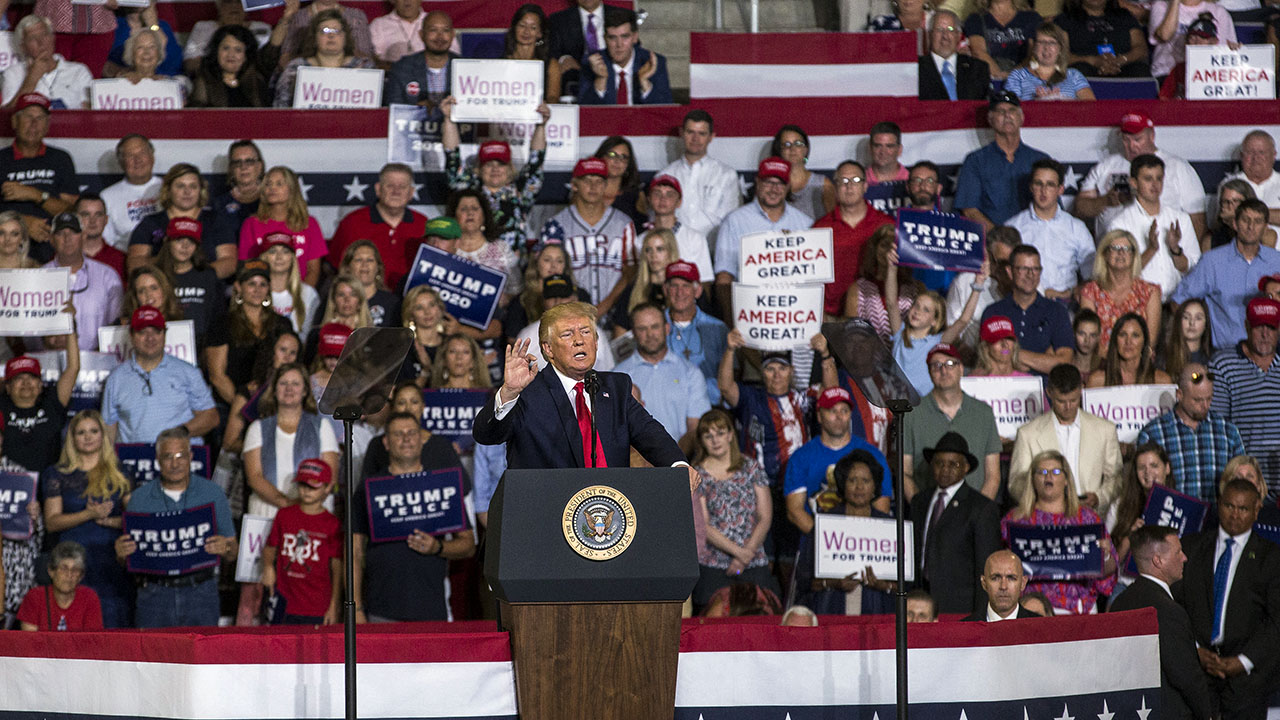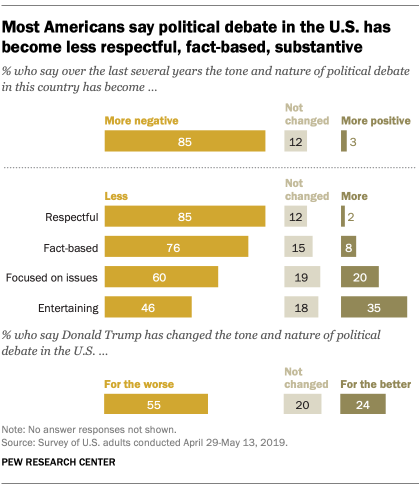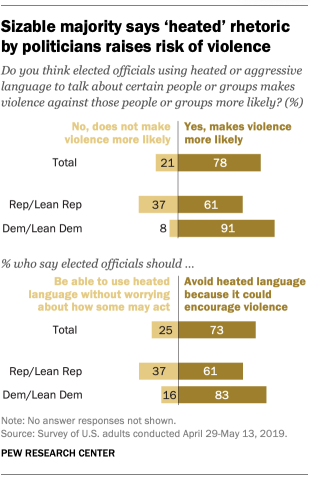
President Donald Trump’s recent attacks on four first-term lawmakers – all women of color – triggered an impassioned response from House Democrats, who overwhelmingly backed a House resolution condemning the president’s remarks. This is just the latest chapter in a long-running debate over what language is appropriate in political debates in the United States. A recent Pew Research Center survey examined Americans’ attitudes about this topic, including Trump’s impact on political discourse and the potential risks from incendiary rhetoric from elected officials:
[bignumber]Large majorities of Americans say the tone and nature of political debate in the United States has become more negative in recent years. More than eight-in-ten U.S. adults (85%) say that political debate in the country has become more negative and less respectful, according to a survey conducted this spring. About three-quarters (76%) say it has become less fact-based and 60% say it has become less focused on issues.
[bignumber]Donald Trump is a major factor in people’s views about the state of the nation’s political discourse. A majority (55%) say Trump has changed the tone and nature of political debate for the worse, while fewer than half as many (24%) say he has changed it for the better. One-in-five Americans say he has had little impact.
Democrats and Democratic-leaning independents overwhelmingly (84%) say Trump has changed political discourse for the worse. About half of Republicans and Republican leaners (49%) say he has changed it for the better, while 23% say he has changed it for the worse and 27% say he hasn’t changed it much either way.
Eight-in-ten or more Democrats say Trump’s comments often or sometimes make them feel concerned, confused, embarrassed, exhausted, angry, insulted and frightened. While Republicans are considerably less likely than Democrats to report these negative reactions to Trump’s rhetoric, about six-in-ten (59%) say they are at least sometimes concerned by his comments, while about half say they are at least sometimes confused (47%) or embarrassed (53%). About seven-in-ten or more Republicans say his comments often or sometimes make them feel entertained, informed, hopeful, excited, happy, proud, respected and inspired.
[bignumber]Majorities of Americans have strong feelings about what is acceptable for elected officials to say in political debate. Most agree that it is fine for an elected official to say their opponent is uninformed on the issues. But 41% say it is never acceptable to say their opponent is anti-American, and another 31% say this is rarely acceptable. Among Republicans, just 25% say it is never acceptable to accuse an opponent of being anti-American, while 53% of Democrats say this is out of bounds. Notably, those in both parties are more likely to say this rhetoric is acceptable when an elected official of their party is accusing an opponent of the other party. But the partisan gap remains: Just 30% of Republicans say it is off-limits for a Republican to call a Democratic opponent anti-American, while 45% of Democrats say it is off-limits for a Democrat to say this about a Republican opponent.
[bignumber]Americans broadly agree that elected officials should avoid using heated language because it could encourage violence. Nearly three-quarters of Americans (73%) say this, while just a quarter believe that elected officials “should be able to use heated language to express themselves without worrying about whether some people may act on what they say.”
While majorities in both parties say officials should avoid heated language, this view is more widely held among Democrats (83%) than Republicans (61%).
[bignumber]Republicans believe that the national climate for political discourse is more hospitable to Democrats than for the GOP. Nearly two-thirds of Republicans and Republican-leaning independents (64%) think that “Democrats in this country are very comfortable to freely and openly express their political views,” but only about a quarter (26%) think Republicans around the nation experience that same level of comfort. The sense of an unequal environment for political expression is most pronounced among conservative Republicans and Republican leaners: 69% think Democrats are very comfortable to freely express their views, while just 23% think Republicans are very comfortable, a 46 percentage point gap.
[bignumber]Most Americans say there is not consensus in the public on what constitutes racist or sexist language. About six-in-ten Americans (61%) say people generally don’t agree about what is considered to be racist language while 38% believe that people do agree on this. Views about agreement over sexist language are roughly the same.
About two-thirds (65%) of Republicans and Republican leaners say people generally do not agree over the definition of racist language; 58% of Democrats and Democratic leaners say the same. Black people are somewhat more likely than whites and Hispanics to say people agree about what is considered racist language, although blacks, whites and Hispanics are all more likely to say people do not agree on what kind of language is racist than to say that there is broad agreement.



